[Analysis] - Star Trek: Countdown To Darkness, And What It Tells Us
Before the release of J.J. Abrams Star Trek reboot, IDW published a fantastic four part series comic called Star Trek Countdown, which was marketed as introducing the film's villain, Nero. It turned out to be so much more then that, being the last canon(ish) story set in the Next Generation timeline, correcting several mistakes made by the nearly franchise killing Nemesis, and weaving the story of Spock's journey into the alternate timeline with the lives of Picard, Data, Geordi, Worf. It was a far superior send off from one spin-off to the other then they managed in the film Generations, and it provided closure to those characters, whom we'll probably never see again (on film).
So, when it was announced that the upcoming Star Trek Into Darkness would be getting the countdown treatment, I was excited. Rather then focus on the film's villain, played by Benedict Cumberbatch, it would bridge the gap between the two films, and set up the events of the new movie. The results? Honestly, nothing special. Certainly not in the same league as the original Countdown book.
But it does provide some interesting bits of information that, while might not directly impact the coming film, certainly were of interest to this lapsed old Trekker. After the jump, and a short review of the book, we'll examine those little tidbits that this canon(ish) tale have added to the new Trek universe. Contains spoilers for all four issues of the Countdown to Darkness.
Countdown to Darkness isn't really a prequel comic, not in the way Countdown was. Countdown was a direct predecessor to the story that took place in the film, involved principle characters from the film, and the events of one had a direct influence and effect on the other. CtD reads more like just another story arc from the ongoing IDW Star Trek series (both of which are written by Mike Johnston and drawn by David Messina). To add to this, the ongoing series will continue with the film's story immediately afterwards, in After Darkness. The book also deals with the same basic character arcs, and touches on a couple of the same thematic and emotional issues that they've already covered in the ongoing series, a series which has dramatically improved over it's first 20 issues, once they moved away from just adapting original series episodes and started doing their own thing.
Countdown to Darkness is set up like most of the original series was: the Enterprise arrives at a planet, attempts not to violate the Prime Directive, fails miserably, and is startled to discover advanced technology and malicious intent already at play with the native inhabitants. The crew on the ship above then have to fret over the safety of Kirk, Spock and the away team. It is the standard Star Trek plot. Like the reboot film, the real meat isn't with the action, it's the characters. And if this book has any direct connection the new film, it will be in setting up the emotion state of the characters. So, what does Countdown to Darkness tell us about what to expect from Into Darkness, and what additional details has it revealed about this new as-of-yet largely unexplored timeline?
Kirk is Lonely
While the captain's log on the various series was invented and used as an exposition dump for the audience, in the films they were better used for revealing the emotional conflicts within the characters. Perhaps the best use of the log as a device was in Undiscovered Country, when Kirk admits his prejudice against Klingons, due to the death of his son. In CtD, the first we see of Kirk is his lamenting the fact that because of the nature of command, he is isolated on his own ship, without anyone to act as a calming influence in times of great pressure.
Since we know that Alice Eve will be playing Carol Marcus, who in the original timeline was mother to Kirk's bastard child, this is clearly setting up Kirk's desire to find a stable relationship, rather then just a endless parade of green skinned one nighters. However, in the original timeline, Kirk's permanent loneliness was a defining part of the character; despite his romantic intentions, he was always destined to die alone. As Robert April comments in the third issue, no one should "fall for enlisted men. It only ends badly." Into Darkness may well touch on whether this holds true in the new timeline.
Spock is Sad
The book begins with Spock having a recurring nightmare about the destruction of Vulcan, and his inability to save his mother's life in the original film. While it remains unclear how much time has past (the intro mentions months non specifically), that Spock is suffering from some serious post-traumatic depression is a good indication of where he is headed, and his ongoing battle with his emotional state. Later on in the book, Spock takes off on a one person rescue mission, to retrieve a captured Sulu and Cupcake, which is almost certain to be a suicide mission.
The trailers for the new film, and the extended intro sequence shown in IMAX this past summer, have shown Spock taking unnecessary risks, taking off after Cumberbatch's Harrison by himself, and dropping himself into a volcano. Spock's actions suggest that, while still technically doing his duty, Spock is nursing a pretty intense death wish. And as Spock as has in the past (future), "I've been dead before."
Everyone Is Loosing Focus
While the first film was about getting everyone into familiar positions, beginning in the comics, and undoubtedly into the next film, will be the characters questioning their positions, and what is expected of them now. In issue three, Kirk and Spock discuss Spock's disobeying of a direct order. Kirk flat out states that he has no problem with Spock getting himself killed, so long as no one else on the crew is killed in the process, and promises that Spock will be punished, but once Spock admits that what he did was wrong, Kirk brushes it aside (despite the fact that the books makes it obvious that Spock has no intention of learning from this lesson).
At the end of the book, Kirk admits that he believes Starfleet has the wrong priorities, and the Prime Directive is as harmful as it is protective. Combined with Starfleet Intelligence's sweeping April under the carpet, it is a sure sign that Kirk's faith in Starfleet, a faith he's never had 100% of, due to his father's death, has eroded even further. Even Uhura, perhaps the most career minded and responsible character in the first film, recognises that her relationship with Spock is deteriorating, largely because of Spock's inability to come to terms with his personal issues, and is having her own judgement impaired because of a constant worry over Spock. Ironically, because Spock is unwilling to admit he is emotionally compromised, he is compromising those around him. I suspect this will have great implications in the film.
Robert April Exists
Robert April was the name Roddenberry gave to the captain in his original script, before he became Christopher Pike, and eventually James T. Kirk. April never appeared on the series, but has long lingered on the edge of canon, as he does here. April is introduced as a former Starfleet Captain who has spent the last twenty years fighting a civil war on a primitive planet, whose sense of injustice is so strong he forsakes his duty to protect an alien species, to such extreme lengths as taking over the Enterprise and offering it to the Klingons.
This Is Not The First Enterprise
Not only does April exist, but he reveals that the current Enterprise isn't the first. This isn't surprising, since Enterprise is a name of long naval tradition, and even in universe the Starfleet began with the NX-01. Remember back to the opening sequence of the Abram's film; the Kelvin was designed to look and feel like the original series ship: square captain's chair, dull consoles, close quarters, even the uniforms were patterned off the original series costumes. The explanation in-universe for why the Enterprise looked more advanced was down to scans of the future technology from Nero's ship. Thus, the Enterprise got shiner consoles, more streamlined designs, a bigger hull, and brand new uniforms. April's revelation reveals that his Enterprise, retired after decades of faithful service only just before the new ship was launched, was the ship seen in the original series. Essentially making Kirk's ship the Enterprise-A.
April Can Take Control Of The Enterprise
Not only was April the captain of the Enterprise, but despite his isolation on an alien world, a protocol from his original ship was embedded into the new Enterprise's programming that allowed April to take absolute control of the ship's functions at a word. This plot made very little sense, but might be a hint of other subversive tactics and loopholes, or a sign of institutional rot within the fleet. The trailers for the film have made much of Harrison's being able to access Starfleet protocols, possibly using the same methods April used to take possession of the Enterprise. It also serves as little call back to Kirk's use of Starfleet prefix codes in Wrath of Khan.
Trust In First Officers
During the confession of his exodus, April reveals his first mate on the original Enterprise was Alex Marcus. This is assumed to be the character played by Peter Weller in the film, identified as Admiral Marcus, and father to Kirk's love interest Carol. April describes Alex's loyalty to his captain as absolute, saying he was "the best man I ever knew." Marcus lies to Starfleet about April's death, and maintains that deception for twenty years. During this conversation, April calls Kirk and Spock's relationship into question, which is further strained by Spock later running off on his suicide mission. The first movie made a very non subtle point about how only when Kirk and Spock work together, establishing a friendship that will last throughout time, are they at their strongest. In the IMAX released clip from the beginning of the new film, Bones maintains that if Kirk were trapped with no hope for escape, Spock would leave him to die. Certainly not the best foundations for "I have been, and forever shall be, your friend."
Harry Mudd Bred
In the book's second big reveal (after April), they introduced Mudd's daughter, a half Bajoran, and trader/gun for hire. Acting more as April's side kick, not much is revealed about Mudd, and it can be assumed that she was arrested for taking part in April's mutiny. Probably more an acknowledgement of how many people thought Mudd would be the villain in the sequel back in 2010, and a play on the classic episode title Mudd's Women.
Sulu Keeps Knives Everywhere
It's odd that of all of Sulu's moments, the one of him sweaty, running down the corridors with a sword, has become the one that defines the character. In the first film, this was referenced in the movie's sword fight, and Sulu's fencing training. In this book, it is revealed that Sulu has received "special dispensation" from Kirk to be armed at all times, and carries knives in his boots. Never underestimate the usefulness of a secretly armed crew member, and the chances of Sulu knifing someone in the new film might have increased significantly, though the prospect of Sulu becoming knife crazy as the franchise moves forward is a little bizarre.
Klingons Are Ready For War
The focal point of the second two issues of the comic is the reveal that the Klingons and the Federation are on the brink of war, with Klingons making greater strides and bolder political and military advances into neighbouring territories. April suggests that the situation is a powder keg, and the proxy war being fought on April's planet has the potential to push more civilisations into full out war. April eventually offers the Klingons the Enterprise in exchange for them leaving his planet alone (a skewing of priorities if ever there was one), which the Klingons leap at the chance of. Clearly, they are very interested in getting a look at the significant advances in technology that have occurred since Nero's time travel adventure. The Klingon ship seen in the book, and glimpsed in the trailers, are clearly less advanced then the Birds of Prey we're used to, and far more ramshackle then the sleekly engineered Starfleet vehicles.
McCoy Is In Charge
There is a short exchange mid series, where McCoy has been left in charge, while Kirk and Spock are stuck planet-side, and Uhura has abandoned her post to go running off after Spock. McCoy, as he did in the first film, and looks to get in the second, is significantly short changed in this book. But his sussing out of his abilities as acting Captain seem like the sort of important information that might pay off down the line. His discovery that he can "turn us around and fly us back to Mississippi," might suggest that McCoy will be forced to make some unpopular decisions in the coming film.
John Harrison
This comic reveals nothing about John Harrison, who he is, what his backstory may be, the motivations for his impending attack on Starfleet, and whether or not he is actually Khan, or Gary Marshal, or a Horta in disguise.And I'm alright with that. I'd rather John Harrison be a mystery left to the film, and I'd much rather John Harrison turn out to be original character John Harrison, with his own personal motives and intentions, rather then a retread of a classic villain, especially Khan. What the book does do is seed the little details, about trust and loyalty, and Starfleet not being the haven of idealistic prosperity that it appears to be. The lense flares are obscuring the ragged edges, and April's plight in this book is probably going to be a reflection of Harrison's come the film.
The more I see of the trailers and footage, the more I'm not convinced that Cumberbatch is the villain. I mean, yes obviously, terrorist and mass murderer, but one man's terrorist is another man's etc. Kirk, April and Harrison may form a scale of disloyalty within the fleet. Kirk, annoyed, but working to change things from within; April, frustrated at the inflexibility of the organisation; and Harrison, taking things to an extreme. If the overall theme of the first film was destiny, then I suspect that trust and loyalty will be the themes of this film. Who do we trust, and why do we choose to trust them over others? What is it about certain people that make them trusted when they shouldn't be, and why are some people forced to make big expressive displays just to be noticed?
And to what lengths must we go to win back the trust that was lost?


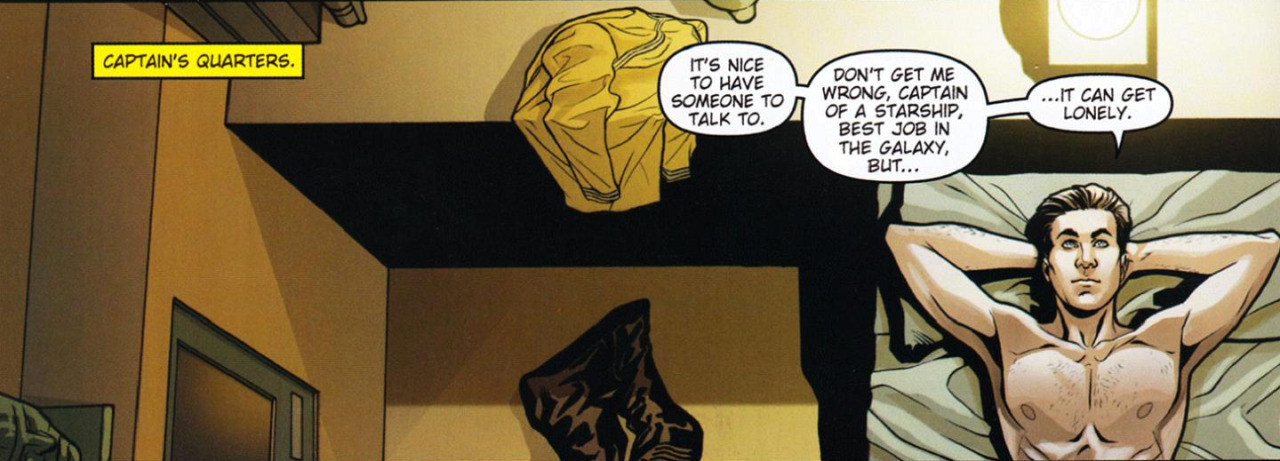

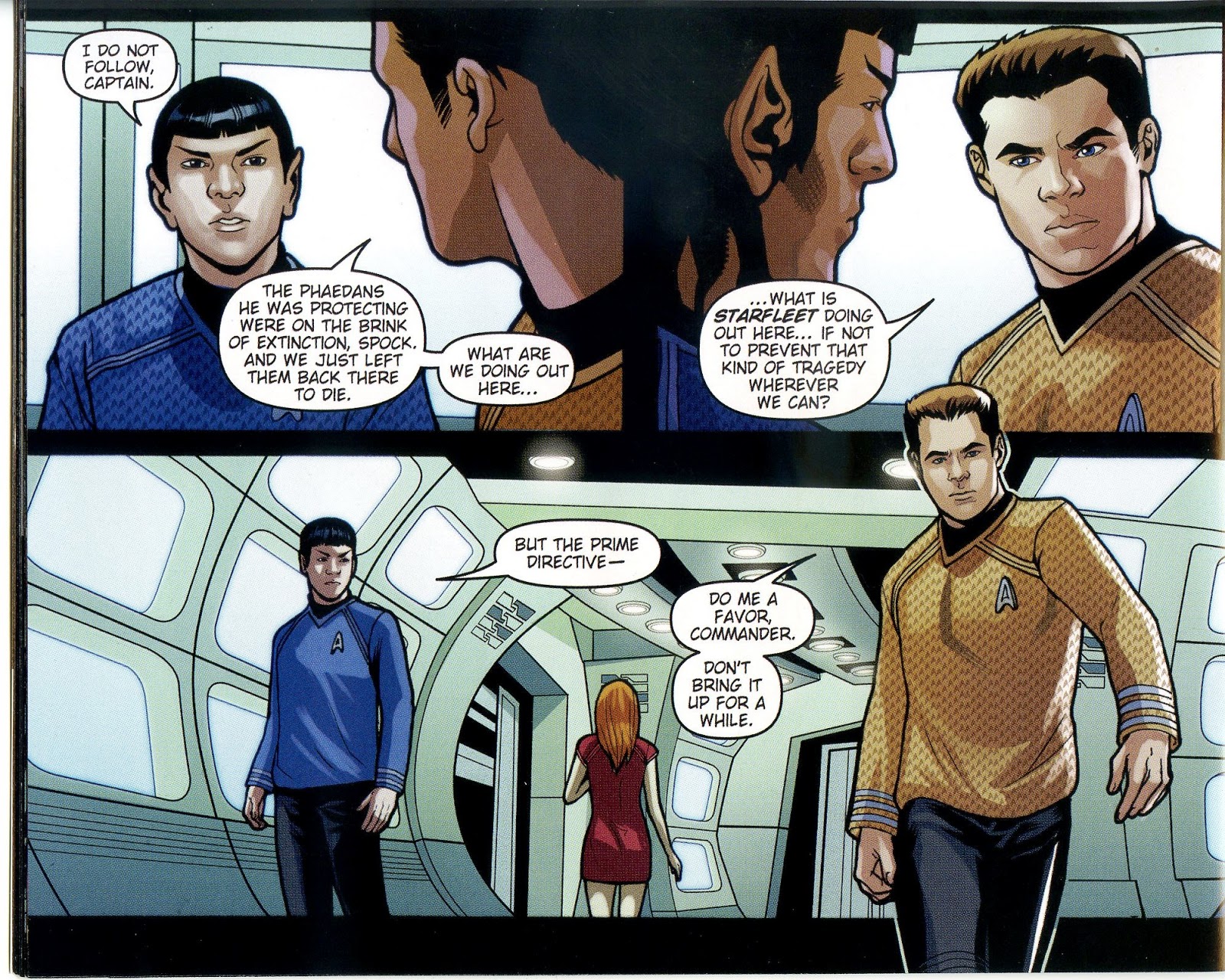


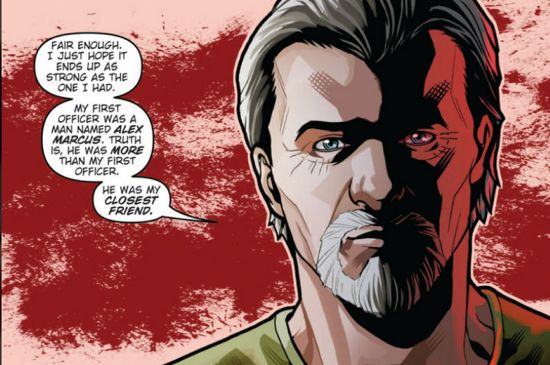
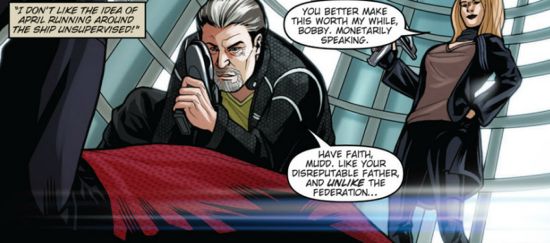


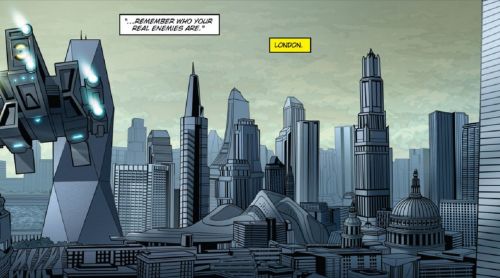
0 comments :
Post a Comment